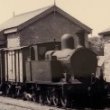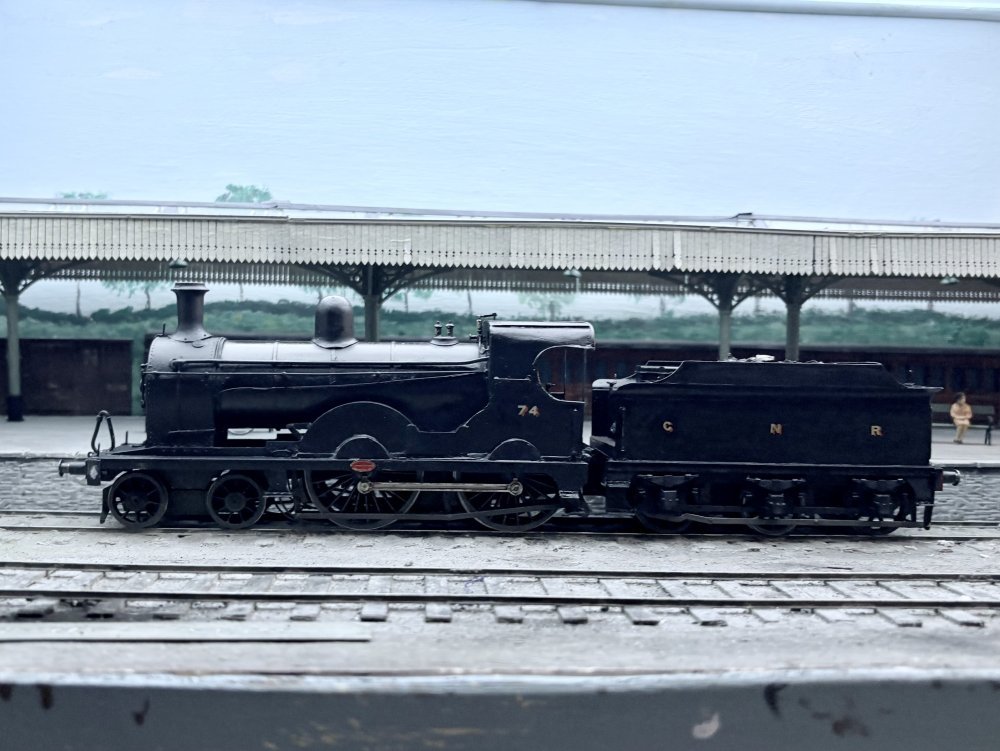-
Posts
4,641 -
Joined
-
Last visited
-
Days Won
59
Content Type
Profiles
Forums
Events
Gallery
Everything posted by Galteemore
-

Brookhall Mill - A GNR(I) Micro Layout
Galteemore replied to Patrick Davey's topic in Irish Model Layouts
That’s a pretty warped view of things -

Brookhall Mill - A GNR(I) Micro Layout
Galteemore replied to Patrick Davey's topic in Irish Model Layouts
Yes, it was length of traverser and the size of the shops - 39’: Glover tanks needed their buffers removed to fit in! Whether the GN actually needed a 4-6-0 is also a moot point….the proposal came along in 1911, before Glover’s arrival and the design of the S class. As an NER man, Glover was well used to 4-6-0s but obviously chose not to build his own. Indeed, on the NE Glover would have seen how Worsdell’s R class 4-4-0s took over work that the 4-6-0s struggled with! Pic by M Peirson. The S proved that a large 4-4-0 could effectively do anything the GN asked of it and an S on form with a top crew was even a match for the V and VS. And unlike them, it could also work the Derry Road - and even reach Enniskillen if the civil engineer wasn’t looking….. Sorry Patrick - thread creep!! What would Mr Weaver say? -

Brookhall Mill - A GNR(I) Micro Layout
Galteemore replied to Patrick Davey's topic in Irish Model Layouts
Now there’s a lot of familiar faces! Wonderful event - thanks for sharing. Last time I had a running day with Norman was about 25 years ago when we ran our live steamers on each others lines. Is that a GN 4-2-2 he’s built lurking in the background behind the NCC 2-4-0? Lovely models. And a fabulous setting. Know anyone who could compose a Planxty in its honour ? -
Funnily enough the Jubilees were influenced by Irish politics…a large number of the class were named after places that the UK had constitutional ties with. Up to 1938 one was thus named ‘Irish Free State’ - then renamed to ‘Eire’ !! Four were also named after the Irish provinces. https://www.farishnspares.co.uk/graham-farish-by-bachmann/jubilee-eire-name-board-b6012.html
-
Incredible given that she was once considered unrestorable and was simply bought as a source of parts ! Have a close look at her centre driving wheels…..https://www.pinterest.co.uk/pin/two-lms-jubilees-ended-up-in-woodhams-yardthe-other-one-45690-leander-left-in-1972this-one-45699-galatea-due--473581717037851916/
-

Ernies Massive Irish 1930's to 2005 Photo Archive
Galteemore replied to Glenderg's topic in Photos & Videos of the Prototype
Lovely little scene Ernie. The kids hitching a ride is a nice touch! -
V for vacuum?
-
Sorry - that’s the bit about scratchbuilding that no one tells you….you become both a perfectionist and your own worst critic!! Looks good to me. As does the GN coach lurking in the rear !!
-

Ernies Massive Irish 1930's to 2005 Photo Archive
Galteemore replied to Glenderg's topic in Photos & Videos of the Prototype
Nice, if sad picture of @David Holman’s Wolf Dog. -
Looks wonderful!
-
Nice scene - looks well. Look forward to hearing more about the carriage. Have the loco crew jumped off anticipating a crash ?
-
In Cardiff Bay today, where ships were controlled by semaphore signals…..some still have arms but not these ones. I’m presuming they’ve found a home at the nearby rugby stadium…,,
-
Excellent work. One of the delights of this forum is to see people making Irish models from scratch, and this is a lovely model. Totally agree - I’d have badged mine up as G N too! I’d like to know more about the trimming plane please as I have some major plastic work coming up.
-
-
I’d try the swap route first myself…..
-
Although Bulmers made a significant contribution to the UK preservation scene. All those apples didn’t die in vain. https://www.kentrail.org.uk/bulmer_cider_train.htm
-
You want to be well pleased with that. Beautifully finished off. It looks like a kit that you have had professionally built - inside and out. That opening scene could almost be Donaghadee harbour siding. The noise thing seems to be a feature of the recording process - mine always sound worse too!
-
Special ‘fly away’ ring pulls.
-

Review of Ireland's Rail Network
Galteemore replied to Barl's topic in What's happening on the network?
-
The LRM axles are good classic technology, but the jig lifts things to another level. I have a 7mm one from Hobby Holidays that is worth its weight in gold.
-
Jigs and rolling bars. There’s an answer to everything ! In all seriousness it’s nowhere near as hard as people think. You can probably get rods from a 4mm supplier. Use them to mark out the axle holes and drill. Poppy’s Wood Tech do a 4mm jig which will hold it all together while you solder it. It’s possible to get a running chassis without any fettling that way. As for boiler, brass or plastic tube if you don’t fancy rolling one.
-

Ernies Massive Irish 1930's to 2005 Photo Archive
Galteemore replied to Glenderg's topic in Photos & Videos of the Prototype
Interesting how those little Victorian 2-4-2Ts, both GN and GSWR, lasted almost to the end. I wonder if 42 showed her legendary paces on those Kingsbridge -Inchicore passenger workings she used to do in between pilot turns. In north Dublin, JT no 91 was doing similar work up until 63, I think, having been retrieved from the loco dump at Dundalk. I built 42 a few years ago, but she now resides in the USA! -
Got to be the BCDR’s speed machine next . The famous No 6…..seen here before her transformative Belpaire firebox went in.
-
It will. Generally speaking enamel on acrylic works ok but don’t try the other way round!
-
They only had the deflectors later in life JB under SR management. Were delivered like that.
.png.c363cdf5c3fb7955cd92a55eb6dbbae0.png)








